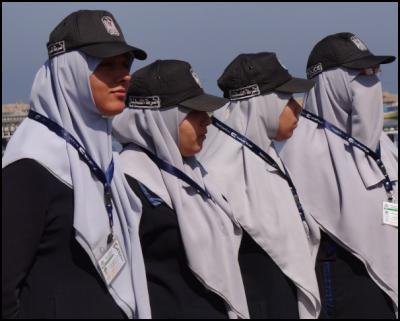Gaza in crisis following Rafah, tunnel closures
Gaza in crisis following Rafah, tunnel closures: police called in to transport the public
by Julie
Webb-Pullman
September 18, 2013
The Gaza Strip is facing a humanitarian crisis, with such a critical shortage of gasoline that police have been ordered to transport students and workers to schools, universities and workplaces, the Ministry of the Interior has reported.
Police authorities took the drastic measure on Tuesday to alleviate the crisis that has arisen in the fuel sector since the closure of the tunnels that formed the only lifeline to bring basic necessities into the enclave in defiance of the illegal – and crippling – Israeli siege of Gaza. Students and workers have faced waits of several hours for public transport, or been completely unable to attend, bringing the region to a virtual standstill.
Students and workers are not the only ones affected. At its weekly meeting on Tuesday, the Gaza Council of Ministers called for international action to avert the growing humanitarian crisis caused by the severe impact of the closures on the health sector. Generators are unable to operate because of the fuel shortage, limiting the provision of critical services in clinics and hospitals, while some 30% of essential medicines and supplies are completely unavailable, and more than 500 patients cannot leave through Egypt to get urgent medical treatment.
While Egyptian authorities have agreed to open the Rafah Crossing on Wednesday and Thursday for four hours each day for ‘emergency cases only’ this will barely make a dent the 500+ medical cases, let alone the 5,000 humanitarian cases, students, business people, and workers waiting to cross, some for several weeks, if not months.
Whilst the Egyptian closure of the Rafah Crossing and the tunnels has exacerbated the existing situation, the fundamental issue to be tackled is the illegal Israeli siege of Gaza, strengthened to strangling point in 2006.
In its 2012 Annual Report released in March, The Palestinian Centre for Human Rights (PCHR) lamented the fact that the Israeli siege of Gaza has become institutionalised, and risks becoming legitimised by the international community, even if inadvertently.
“… [Israel’s] systematic policies have consistently violated the right to an adequate standard of living, the right to adequate housing, education, and social security, and the right to the highest attainable standard of mental and physical health,” PCHR said then.
“The crisis can be ended only with the immediate lifting of the closure, the removal of the restrictions on movement to and from the Gaza Strip, and the reversal of the ban on exports.”
How much truer that is now, with Egypt’s closure of the Rafah Crossing, and the tunnels that provided the only relief.
The international community, particularly the High Contracting Parties to the Fourth Geneva Convention Relative to the Protection of Civilian Persons in Time of War, must heed the cries from Gaza, and exert effective pressure on Israel, as well as on Egypt, to prevent further unnecessary, indefensible, and reprehensible Palestinian suffering and loss of lives.

Gaza Policewomen
ENDS


 Binoy Kampmark: Fencing The Ocean - Australia’s Social Media Safety Bill
Binoy Kampmark: Fencing The Ocean - Australia’s Social Media Safety Bill Binoy Kampmark: Trump, AUKUS And Australia’s Dim Servitors
Binoy Kampmark: Trump, AUKUS And Australia’s Dim Servitors Peter Dunne: Dunne's Weekly - The Wrong Answer To A Question That Does Not Exist
Peter Dunne: Dunne's Weekly - The Wrong Answer To A Question That Does Not Exist Martin LeFevre - Meditations: Perception, Conception And Beauty
Martin LeFevre - Meditations: Perception, Conception And Beauty Alastair Thompson: On The Publication Of The First NCQG Text 'New Collective Quantified Goal On Climate Finance'
Alastair Thompson: On The Publication Of The First NCQG Text 'New Collective Quantified Goal On Climate Finance' Ramzy Baroud: A Nation In Denial - Why Israel’s Defeat Is Imminent
Ramzy Baroud: A Nation In Denial - Why Israel’s Defeat Is Imminent